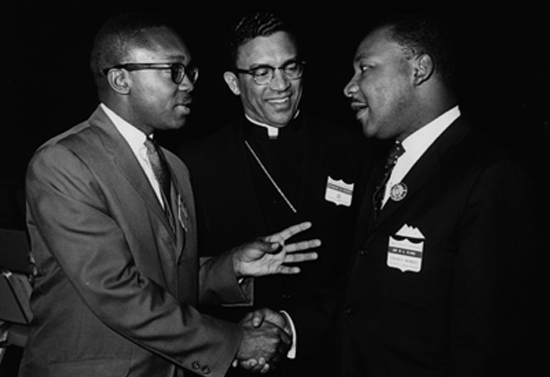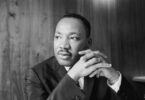Editor’s Note: A version of this post appeared on LinkedIn Pulse.
It seems the most talented professionals tend to say the least about themselves. One such professional is African American public relations legend Ofield Dukes. His pioneering work in communications, during some of the most racially charged years in America, places him in an elite class of public relations founders.
Sincere, hard-working and humble are characteristics of this man who advised countless leaders and helped others. Dukes was born in 1932, in Alabama. His parents were cotton share croppers. He said he and his sister collected sticks on their way to the black schoolhouse to help heat the one-room building. He died in 2011 at the age of 79.
After serving in Korea with the U.S. Army, he used his GI Bill benefits to attend Wayne State University. In 1958, he graduated with a degree in journalism, and became a reporter at the Michigan Chronicle, an African American newspaper.
In the mid-1960s, Dukes moved to Washington, D.C. He was offered a position as Deputy Director of Information for the President’s Committee on Equal Employment Opportunity, in the Johnson-Humphrey administration. In 1969, he opened Ofield Dukes and Associates, where he worked the remainder of his career. He specialized in political and minority affairs.
Dukes had legendary clients including author Alex Haley and Motown Records. He also worked to organize the national holiday honoring Rev. Martin Luther King, Jr.
He received PRSA’s highest honor, the Gold Anvil Award in 2001, the same year he was inducted into the distinguished PRSA College of Fellows. He loved Detroit and helped the PRSA Detroit Chapter obtain the 2008 International Conference bid. A year prior, in 2007, Wayne State’s PRSSA Chapter honored him with a Distinguished Alumni Award.
I had the privilege of getting to know Ofield during the last decade of his life, through my Detroit Chapter board positions. From conversations with him and observations I learned:
- Be a good listener. Every time I called, Ofield answered his own phone. He recalled conversations we had, sometimes a year earlier. He never seemed rushed, rather he seemed genuinely thrilled to catch up and to see how he could help.
- Be inquisitive. I offered to pick Ofield up at the airport when he arrived to receive his 2007 Wayne State award. I wanted to learn about him, but instead he asked me questions. He was genuinely interested and wanted to know how I was balancing a career and a family. He asked about the city’s renaissance; and wanted to talk about the Cadillac SR, I was driving.
- Don’t wait to be asked to help others. In addition to helping the Detroit chapter obtain the International conference bid, he said he’d help with anything we needed.
- See opportunities in challenges. I asked how he didn’t become resentful from discrimination that went all the way back to not being able to work at the white Detroit daily newspapers, when he graduated. He said because of having to take a narrower path he had opportunities to cover historical events, to work with and advise countless leaders. He was able to make a difference through the power of communications.
- Mentor students and new professionals – mentor everyone. Ofield loved students and shared his time and wisdom throughout his career, formally as an instructor at American and Howard Universities, and informally with anyone who asked.
- Don’t assume gifted professionals don’t want to be recognized. I sat next to Ofield at the PRSA Detroit Chapter’s annual meeting, about a month before he died, in late 2011. His sister brought him to the dinner. He was too weak from a cancer treatment he received that day to attend alone, but his sister said he refused to miss the event. He told me how happy he was to be part of the Detroit community of professionals. He appreciated our recognition. It’s good to tell our mentors that what they’ve done made a difference in our lives. Everyone wants to know he or she lived a life that mattered. Ofield Dukes, APR, Fellow PRSA, led such a life and many are richer for the experience.
 Mary Henige, APR has 30 years of automotive communications leadership experience at General Motors. A past PRSA-Detroit Chapter president, she co-chaired the 2008 PRSA International Conference, in Detroit. She has served as the professional advisor to Wayne State University’s PRSSA Chapter since 1993. She also is an advisory board member for the Museum of Public Relations History. In 2011 she was inducted into the PR News Hall of Fame for her contributions to the industry. She is available to coach senior business and communications leaders, through Magnetica Communications LLC, which she recently founded. You can connect with her on Twitter: @maryhenige.
Mary Henige, APR has 30 years of automotive communications leadership experience at General Motors. A past PRSA-Detroit Chapter president, she co-chaired the 2008 PRSA International Conference, in Detroit. She has served as the professional advisor to Wayne State University’s PRSSA Chapter since 1993. She also is an advisory board member for the Museum of Public Relations History. In 2011 she was inducted into the PR News Hall of Fame for her contributions to the industry. She is available to coach senior business and communications leaders, through Magnetica Communications LLC, which she recently founded. You can connect with her on Twitter: @maryhenige.







